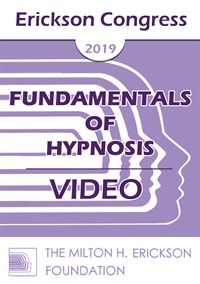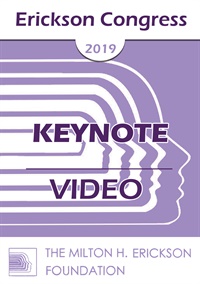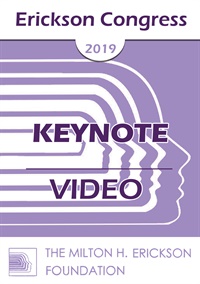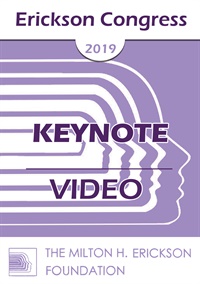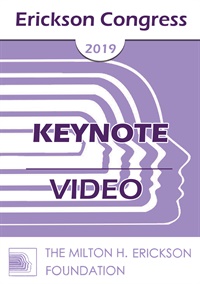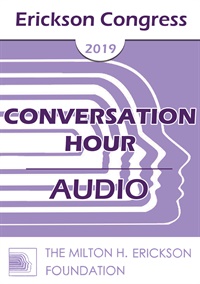
- Average Rating:
- Not yet rated
- Topic Areas:
- Conversation Hours | Ericksonian Hypnosis and Therapy Techniques | Gender | Masculinity | Psychotherapy
- Categories:
- Erickson Congress | Erickson Congress 2019
- Faculty:
- Rick Miller, MSW
- Duration:
- 54 Minutes
- Format:
- Audio Only
- Original Program Date:
- Dec 14, 2019
- Short Description:
- Learn Ericksonian principals for encouraging men to participate and enjoy psychotherapy. Utilize strategies for dealing with their own biases regarding difficult men. Expand definitions of healthy masculinity.
- Price:
- $15.00 - Base Price
- Average Rating:
- Not yet rated
- Topic Areas:
- Fundamentals of Hypnosis | Hypnosis | Hypnotic Phenomena | Hypnotherapy | Ericksonian Hypnosis and Therapy Techniques
- Categories:
- Erickson Congress | Erickson Congress 2019
- Faculty:
- Dan Short, PhD
- Course Levels:
- Master Degree or Higher in Health-Related Field
- Duration:
- 2 Hours 1 Minutes
- Format:
- Audio and Video
- Original Program Date:
- Dec 15, 2019
- Short Description:
- Erickson resisted standardized hypnotic protocols because he found that everyone responded to hypnosis uniquely. Rather than seeking to force his preferred hypnotic phenomena, he cultivated whatever came naturally. Fortunately, clinical objectives, such as pain relief, can be achieved using a variety of hypnotic phenomena. This session will identify three broad classes of hypnotic experiencing and provide guidance on how to identify natural predispositions.
- Price:
-
Sale is $29.00
price reduced from Base Price - $59.00
- Average Rating:
- Not yet rated
- Topic Areas:
- Keynotes | Hypnosis | Ericksonian Hypnosis and Therapy Techniques | Milton Erickson
- Categories:
- Erickson Congress | Erickson Congress 2019
- Faculty:
- Roxanna Erickson Klein, RN, PhD, LPC, LCDC
- Course Levels:
- Master Degree or Higher in Health-Related Field
- Duration:
- 59 Minutes
- Format:
- Audio and Video
- Original Program Date:
- Dec 12, 2019
- Short Description:
- This Keynote event offers a historical perspective of how Milton Erickson’s views of hypnosis evolved over a lifetime. By reviewing publications from his early works in the 1920s over the next half century Roxanna summarizes shifts on style and emphasis and emphasis. Using this framework, attendees can gain a deeper appreciation for the evolution of Erickson’s ideas as we self-reflect on the professional growth process and our own development.
- Price:
-
Sale is $29.00
price reduced from Base Price - $59.00
- Average Rating:
- Not yet rated
- Topic Areas:
- Keynotes | Ericksonian Hypnosis and Therapy Techniques | Future Oriented | Milton Erickson
- Categories:
- Erickson Congress | Erickson Congress 2019
- Faculty:
- Michael Yapko, PhD
- Course Levels:
- Master Degree or Higher in Health-Related Field
- Duration:
- 59 Minutes
- Format:
- Audio and Video
- Original Program Date:
- Dec 11, 2019
- Short Description:
- A core element of the innovative psychotherapies of Milton Erickson was his emphasis on helping patients gradually shift from a focus on the unchangeable past to a focus on the positive potentials of the future. In recent years, substantial evidence has accumulated that makes it clear that a focus on the future is far more than just a philosophical preference. In fact, an orientation to the future has been associated with some of the most fundamental aspects of clinical practice ranging from an individual’s personality traits to his or her treatment response. In this address, then, we will consider some of the many facets of a future orientation and some of the ways Dr. Erickson was prescient in his encouraging a future focus in psychotherapy.
- Price:
-
Sale is $29.00
price reduced from Base Price - $59.00
- Average Rating:
- Not yet rated
- Topic Areas:
- Keynotes | Ericksonian Hypnosis and Therapy Techniques | History of Psychotherapy | Metaphors | Utilization | Experiential Therapy | Unconscious Processes
- Categories:
- Erickson Congress | Erickson Congress 2019
- Faculty:
- Stephen Lankton, MSW
- Course Levels:
- Master Degree or Higher in Health-Related Field
- Duration:
- 54 Minutes
- Format:
- Audio and Video
- Original Program Date:
- Dec 12, 2019
- Short Description:
- Dr. Milton Erickson graduated from the University of Wisconsin’s School of Medicine in 1925. During the ensuing 55 years of his career, Erickson was devoted to researching, practicing, learning, refining, teaching, and publishing the lessons borne of his creative intuition and experience. And over the years his practices evolved. The last two decades of his life, and even more so in the 40 years since his death, through the efforts of those he influenced the number of ideas and interventions attributed to Erickson proliferated abundantly.
- Price:
-
Sale is $29.00
price reduced from Base Price - $59.00
- Average Rating:
- Not yet rated
- Topic Areas:
- Keynotes | Trance | Hypnosis | Ericksonian Hypnosis and Therapy Techniques | Resources
- Categories:
- Erickson Congress | Erickson Congress 2019
- Faculty:
- Stephen Gilligan, PhD
- Course Levels:
- Master Degree or Higher in Health-Related Field
- Duration:
- 59 Minutes
- Format:
- Audio and Video
- Original Program Date:
- Dec 13, 2019
- Short Description:
- This talk will outline the view that chronic suffering is maintained by the twin maladies of human disconnection and neuromuscular lock. We will see how Erickson’s great insight was that what comes into human experience can equally be a symptom or a solution, depending on the contextual connection, and how the skillful use of trance can transform long-standing problems into resources. This method cannot be reduced to a technique, it requires a deeply connected, humanizing relationship. The talk will overview what we need to understand and practice to master this Ericksonian legacy.
- Price:
-
Sale is $29.00
price reduced from Base Price - $59.00
- Average Rating:
- Not yet rated
- Topic Areas:
- Keynotes | Hypnosis | Ericksonian Hypnosis and Therapy Techniques | Evocative Communication
- Categories:
- Erickson Congress | Erickson Congress 2019
- Faculty:
- Bill O'Hanlon, MS
- Course Levels:
- Master Degree or Higher in Health-Related Field
- Duration:
- 56 Minutes
- Format:
- Audio and Video
- Original Program Date:
- Dec 15, 2019
- Short Description:
- In this provocative session, Bill O'Hanlon will make the case that Ericksonian Hypnosis does not involve suggestion but instead involves evocation of already existing resources, and that Ericksonian Therapy involves a radical departure from the usual diagnostic, pathological-oriented approach that strives to fix or correct the client’s or patient’s deficits and brokenness.
- Price:
- $29.00 - Base Price
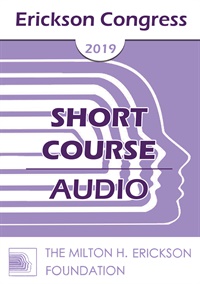
- Average Rating:
- Not yet rated
- Topic Areas:
- Short Courses | Ericksonian Hypnosis and Therapy Techniques | Psychotherapy
- Categories:
- Erickson Congress | Erickson Congress 2019
- Faculty:
- Abraham Hernández Covarrubias
- Duration:
- 1 Hour 26 Minutes
- Format:
- Audio Only
- Original Program Date:
- Dec 12, 2019
- Short Description:
- Erickson was known by the efficiency of his treatments and how he was able to quickly treat difficult patients. He used different strategies and techniques with a unique style. However, he did not create a systematization of his strategies.
- Price:
- $15.00 - Base Price
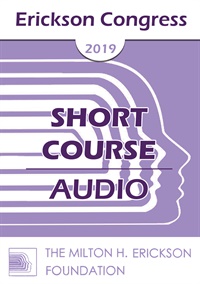
- Average Rating:
- Not yet rated
- Topic Areas:
- Short Courses | Priming | Ericksonian Hypnosis and Therapy Techniques | Language of Hypnosis
- Categories:
- Erickson Congress | Erickson Congress 2019
- Faculty:
- Clifton Mitchell, PhD
- Duration:
- 1 Hour 30 Minutes
- Format:
- Audio Only
- Original Program Date:
- Dec 12, 2019
- Short Description:
- Advances in the priming research have validated the rationale and impact of Erickson’s linguistic techniques. To wit, the priming research has confirmed that we are controlled by an unconscious behavioral guidance system more than previously conceived and, once covertly activated, unconscious goals are just as powerful as or more powerful than conscious goals. To the surprise of many, goals do not require an act of will to be acquired.
- Price:
- $15.00 - Base Price
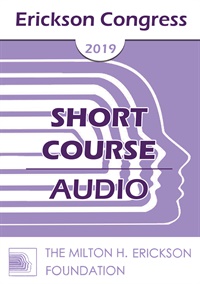
- Average Rating:
- Not yet rated
- Topic Areas:
- Short Courses | Communication | Psychotherapy | Ericksonian Hypnosis and Therapy Techniques | Hypnosis
- Categories:
- Erickson Congress | Erickson Congress 2019
- Faculty:
- Susan Pinco, PhD
- Duration:
- 1 Hour 16 Minutes
- Format:
- Audio Only
- Original Program Date:
- Dec 12, 2019
- Short Description:
- Like much that is deeply imbedded and emergent in our psyches, the mastery of Milton Erickson often defies a simple explanation. Words may be descriptive but fall short of unpacking the exquisite intricacy of his work. With currents as deep as this it has taken years for Jeff Zeig, one of Erickson’s students, to come up with the potent phrase “Limbic Communication” to describe that crucial element that underpins the art and artistry of Erickson and all impactful experiential therapy.
- Price:
- $15.00 - Base Price
Please wait ...


